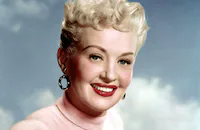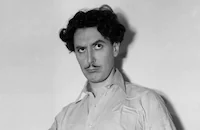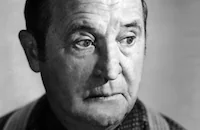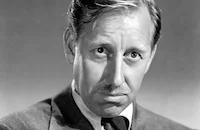The Dolly Sisters

Brief Synopsis
Cast & Crew
Irving Cummings
Betty Grable
John Payne
June Haver
S. Z. Sakall
Reginald Gardiner
Film Details
Technical Specs

Synopsis
In 1904, Hungarian sisters Yansci and Roszika Dolly immigrate to America with their uncle Latsie, and their first stop is a New York City restaurant run by Latsie's friend, Ignatz Tsimmis. To amuse themselves, the girls dance as the restaurant's band plays folksongs, much to the delight of the patrons. In 1912, the girls, now grown, are called Jenny and Rosie, and still love to dance and sing popular songs at Tsimmis'. Needing money to pay Uncle Latsie's debts, Jenny and Rosie persuade Tsimmis to book them elsewhere, and he gets them a job in upstate New York. On the train, the sisters meet singer Harry Fox, who lies about how successful he is, and he is chagrined to discover later that he has been billed below the unknown sisters and Professor Winnup's educated seal. Harry overcomes his embarrassment and over the next several days, romances Jenny. The couple fall in love despite Rosie's dislike of Harry, and on the day the Dollys leave, Jenny promises Harry that she will wait for him. Back in New York City, the sisters try to advance their career but have no luck, until one day, they meet Harry again. Harry and Jenny are delighted to be reunited, and Harry assures the girls that, with his help, they can catch the eye of impressario Oscar Hammerstein, who is looking for exotic acts. Harry installs the girls in an expensive hotel suite and clothes them in lavish outfits, then arranges for Hammerstein to visit. Re-assuming their Hungarian accents, the girls audition for Hammerstein, who is so impressed by them that two weeks later, they are starring in one of his shows. By 1915, Rosie and Jenny are very successful and are about to embark on their first tour of Paris. One day, Harry visits Jenny and admits that he wishes to end their relationship because she has hit the big time while he is still struggling. They resolve their problems though, when song publisher Sam Harris admires one of Harry's compositions, and Jenny retires to marry Harry. On the eve of Harry's first Broadway show, however, he enlists in the Army and is sent overseas. Jenny then accompanies Rosie to Paris, and the Dolly Sisters conquer the Folies Bergere. They then become the toast of London, where Jenny attracts the attention of Tony, the Duke of Breck. A magazine photograph of the couple enrages Harry, who goes to see Jenny while on leave. Harry, who is returning to the United States, demands that Jenny come with him, but she cannot leave Rosie, as they have signed with the Folies Bergere for another season. The heartbroken Jenny files for divorce after Harry leaves her, then immerses herself in a whirlwind of performing, gambling and refusing Tony's marriage proposals. Meanwhile, Rosie has fallen in love with American department store owner Irving Netcher. Back in New York, Harry achieves success and pursues the beautiful Lenora Baldwin. One night, Jenny overhears Rosie tell Irving that they must wait to be married, and in order to free Rosie, Jenny agrees to marry Tony. As they are driving to town for the ceremony, however, Jenny's emotions disorient her and she drives the car off a cliff. Tony is unharmed by the accident, but Jenny is seriously disfigured. On the night that he becomes engaged to Lenora, Harry learns of Jenny's accident, and Jenny is comforted by the telegram he sends. Jenny urges Rosie to marry Irving immediately, and after the couple leave on their honeymoon, Jenny's beauty is saved through plastic surgery. Rosie and Irving soon welcome Jenny to New York, although they are dismayed to discover that she has sold her jewelry to pay her medical bills. Irving agrees to allow Rosie to return to the stage with Jenny, and the sisters are soon appearing at an all-star benefit. Harry is also on the bill, and when Lenora sees Harry watching Jenny, she realizes that he still loves her. Lenora then tells Rosie that she will not be marrying Harry, and watches as Harry invites Jenny to join him onstage for a song. The couple reconcile as they sing together, and happily gesture for Rosie to join them.

Director
Irving Cummings
Cast

Betty Grable

John Payne

June Haver

S. Z. Sakall

Reginald Gardiner
Frank Latimore
Gene Sheldon

Sig Ruman
Trudy Marshall
Collette Lyons
Evon Thomas
Donna Jo Gribble
Robert Middlemass
Paul Hurst
Lester Allen

Frank Orth
Herbert Ashley
William Nye
Peter Cusanelli
Al Murphy
Walter Soderling
Albert Pollet
Rudolf Lindau
Audrey Betz
Harry Seymour
George Davis
Trude Berliner
Igor Dolgoruki
Nino Bellini
Theresa Harris
Roberta Daniel
Nanette Vallon
Carmen Beretta
Eugene Borden
Alphonse Martell
Mary Currier
Claire Richards
Maria Bibikov
Andre Charlot

Edward Kane

Mae Marsh
Else Janssen
Tommy Mack
Frank Penny
Aldo Nadi
Henri De Soto
Serge Krizman
Ricki Van Dusen
Wedgewood Nowell
Gino Corrado
Jean De Briac
Larry Thompson
Virginia Brissac

Frank Ferguson
Franklin Parker
Howard Negley
J. C. Fowler
Betty Farrington
Sam Garrett
Albert Petit
George O'hara

J. Farrell Macdonald

James Burke
Julius Tannen
James Metcalfe
Phil Tead
Craufurd Kent
Crew
George Asaf
James W. Blake
Johannes Brahms
Shelton Brooks
Lew Brown
J. Will Callahan
Harry Carroll
Con Conrad
Walter Donaldson
Doris Drought
Raymond B. Egan
Sam Ehrlich
Seymour Felix
Leland Fuller
Byron Gay
Mack Gordon
Bert Grant
Ralph O. Hammeras
Roger Heman
Charles Henderson
Charles Henderson
George Jessel
Gus Kahn
Natalie Kalmus
Georges Kessel
Gertrude Kingston
Arthur L. Kirbach
R. A. Klune
Lou Kunkel
John Larkin
Charles B. Lawlor
Sam M. Lewis
Thomas Little
Roy K. Marsh
Joseph Mccarthy
Barbara Mclean
James V. Monaco
Richard Mueller
Paul Neal
Alfred Newman
Ben Nye
Orry Kelly
Ernest Palmer
Tom Pitts
Felix Powell
Harry Revel
Frances C. Richardson
Lee G. Roberts
Gene Rose
Walter M. Scott
Fred Sersen
Marian Spitzer
Murray Spivack
Albert Von Tilzer
Henry Weinberger
Lyle Wheeler
Joseph C. Wright
Joe Young
Darryl F. Zanuck

Videos
Trailer
Hosted Intro
Film Details
Technical Specs

Award Nominations
Best Song
Articles
The Dolly Sisters
The film begins with the arrival in America of the girls as children. A few years later, their dancing talent takes them on the road on the vaudeville circuit, where they meet singer-songwriter Harry Fox. Given a break by impresario Oscar Hammerstein, the twins are soon the toast of Broadway, and Jenny marries Harry. During World War I, Harry enlists, and the sisters take their act abroad, becoming successful in Europe as well. But Harry and Jenny's marriage falters due to the girls' success. Meanwhile, Rosie falls in love with a department store heir. A near-tragedy threatens Jenny's life, but all ends happily at a benefit performance in New York.
It took more than two years to get The Dolly Sisters into theaters. The film was first announced in 1943 as a vehicle for Alice Faye, who had been Fox's top musical star in the 1930s. But Faye, who was pregnant with her second child and tired of making musicals, decided to retire, although she was still under contract to the studio. Grable, whom the studio had planned to co-star in the lesser role of Rosie, then stepped into the lead as Jenny. By that time Grable was also pregnant, and the film had to be postponed until after she gave birth in 1944. Several starlets were considered for the part of Rosie, among them Janet Blair and Vivian Blaine. Comedian George Jessel, who had known the real Dolly Sisters in his vaudeville days, was making his producing debut with The Dolly Sisters. He cast newcomer June Haver (with whom, it was rumored, he was having an affair) as Rosie. Playing Jenny's true love was John Payne, making his first film appearance since returning from serving in the military in World War II.
Production finally got underway in January of 1945, and took seven months. Haver was one of several young up-and-comers that studio head Darryl F. Zanuck had put under contract as a threat to keep Grable in line, in the same way that he had brought on Grable as a threat to Alice Faye a decade earlier. But the easygoing Grable had become great pals with Faye, and with her own younger rivals. However, she disliked Haver, with her sanctimonious ways. Grable thought the younger actress was a hypocrite, always quoting the bible, but criticizing Grable her behind her back. The two stars stayed in their dressing rooms between takes, and did not socialize.
The real-life Dolly Sisters had retired in 1927, and Jenny, suffering from depression, committed suicide in 1941. The studio bought the rights to the Dolly Sisters story from Rosie Dolly, who provided a brief biography of their lives and careers that she had written, as well as scrapbooks, correspondence, and newspaper clippings. But she also stipulated that the film could not contain any mention about Jenny's suicide and other family matters.
Even with Rosie Dolly's cooperation, the studio falsified and sanitized much of the real lives of the sisters, which contained tragedy and scandal as well as triumph: they were in many ways the epitome of jazz age excess. The Dollies were small, sleek, dark-haired exotics; Fox turned them into big, blonde, buxom all-American girls. The real Rosie was married three times, and Jenny wed twice, but in the film each one had only one husband -- although, like the real sisters, their movie counterparts had many "admirers," including the Prince of Wales and the King of Spain. The Dollies were also addicted to gambling and expensive jewelry, which the film only hints at, and gambled away millions of one lover's money. Later in life, Rosie also attempted suicide, unsuccessfully.
The Dolly Sisters shows none of that, of course. It leaves the sisters, if not at the height of their fame and glory, at least at a triumphant moment. Critics who still remembered the Dollies fondly complained. New York Times critic Bosley Crowther wrote, "It is not the flamboyant fable of that famous 'sister act' which was the toast (as they say) of two continents and the stuff of many an ink-smeared journalist's dreams. Instead it is a tired and long-drawn stencil of so many old musical film plots that even the legs of Betty Grable and June Haver fail as adequate support." In spite of mostly dismissive reviews like Crowther's, The Dolly Sisters, was a hit, grossing more than four million dollars. Several lawsuits were filed over the film's inaccuracies, by ex-husbands, among others, but most were dismissed.
The Dolly Sisters may not be high art, and it's definitely not fact, but in its glorious excess, the film offers many pleasures for modern viewers: over-the-top costumes by Orry-Kelly; stunning production numbers that rival Busby Berkeley in loony concept, such as the ode to makeup, "Lipstick, Powder and Rouge"; and gorgeous production design by Lyle Wheeler, shot in hyper-saturated Technicolor. There is also a pair of memorable songs: "I'm Always Chasing Rainbows," based on a Chopin melody, and the Oscar-nominated "I Can't Begin to Tell You," which was the only song Betty Grable recorded while under contract at Fox. Zanuck did not allow his stars to make records, but a few years later her husband Harry James's band was recording the song and the vocalist didn't show up, so Grable stepped in and recorded it under a pseudonym -- Ruth Haag, a combination of her own first name and James's middle name.
Director: Irving Cummings
Producer: George Jessel
Screenplay: John Larkin, Marian Spitzer
Cinematography: Ernest Palmer
Editor: Barbara McLean
Costume Design: Orry-Kelly
Art Direction: Lyle Wheeler
Music: "I'm Always Chasing Rainbows," music by Harry Carroll, lyrics by Joseph McCarthy; "I can't Begin to Tell You," music by James B. Monaco, lyrics by Mack Gordon
Principal Cast: Betty Grable (Jenny Dolly), John Payne (Harry Fox), June Haver (Rosie Dolly), S.Z. Sakall (Latsie Dolly), Reginald Gardiner (Tony, Duke of Breck), Frank Latimore (Irving Netcher), Gene Sheldon(Professor Winnup), Sig Rumann (Ignatz Tsimmis), Trudy Marshall (Lenora Baldwin), Collette Lyons (Flo Daly)
114 minutes
by Margarita Landazuri

The Dolly Sisters
The Dolly Sisters - Betty Grable and June Haver are THE DOLLY SISTERS - 1945 Fox Musical on DVD
WWII was winding down when The Dolly Sisters (1945) was made, and 20th Century-Fox studio chief Darryl Zanuck believed that movie audiences wanted something more with their fluff. The Dolly Sisters is definitely a "Betty Grable musical," but it stresses romantic longing and serious relationship tensions over simple frivolity. Seen today, this actually makes it slightly disappointing compared to Down Argentine Way (1940) or Moon Over Miami (1941), two other (and earlier) Grable pictures in Fox Home Entertainment's new five-disc set. The seriousness feels a mite forced, perhaps not what we want from such a movie. The film also suffers somewhat from being a biopic, covering many years of real characters' lives in a way which sometimes can't help but feel plodding - always the main obstacle to making a good film biography.
These are slight criticisms. Grable and June Haver are perfectly enjoyable as Yansci and Roszika (Jenny and Rosie) Dolly, who in real life emigrated to America from Hungary as children in the early 1900s and grew up performing on the vaudeville circuit. They eventually became big stars on Broadway and spent much time in Europe. "The Dolly Sisters" were a famous and celebrated act - forgotten today but widely known by the public in 1945. The movie follows reality to a point. Yes, Jenny Dolly did fall in love with Harry Fox, a vaudeville singer who helped the sisters get started but never hit it big as they did. Whether that professional unevenness created quite the heartache and drama portrayed in the movie is another question. As for the ending, let's just say it's pure Hollywood. Take a look at the DVD's liner notes (by Sylvia Stoddard) to learn what really happened to the Dolly Sisters - a tragedy which the movie simply rewrites.
Does it matter? The mere casting of blondes Grable and Haver as the real-life brunettes Jenny and Rosie should tell us something about whether anyone was even trying to be accurate. The Dolly Sisters is all about delivering the eye-popping sets, colors, and (especially) costumes we'd expect of an 'A' Grable musical, and it offers an overload of pleasurable moments and songs. The two stars perform a spirited rendition of "Carolina in the Morning" in a New York hotel room for Oscar Hammerstein (Robert Middlemass), who promptly signs them to a contract. Mack Gordon and James Monaco's "I Can't Begin to Tell You," sung by John Payne playing Harry Fox, was nominated for an Oscar. Then there's "Powder, Lipstick and Rouge," a jaw-dropping number in which women parade out dressed as, you guessed it, powder, lipstick and rouge (plus mascara and a powder puff, of course). That's Cathy Downs as "Miss Mascara." She'd soon appear as Clementine in My Darling Clementine.
But perhaps the loveliest song is Harry Carroll and Joseph McCarthy's "I'm Always Chasing Rainbows," sung by John Payne as he plays piano in a bar one snowy Manhattan night. Grable joins him halfway through. Unbeknownst to them, George Cohan's partner Sam Harris (Eddie Kane) is standing at the bar, listening, and this leads to Fox getting a singing deal. Lending poignance is the clear impression that Payne and Grable are smoothing over their relationship through singing this song. This is what good musicals do - use numbers to establish and propel emotional relationships - and The Dolly Sisters is a work of professionals all the way.
Haver was being groomed for stardom in her pairing with Grable, just as Grable had been built up at Fox by appearing with Alice Faye in Tin Pan Alley (1940). Supposedly the otherwise easygoing Grable loathed Haver, but she was professional enough not to let it show on screen.
The Dolly Sisters was a huge hit, Grable's biggest to date. Fox Home Entertainment's DVD comes with an enjoyable photo gallery, four "lobby cards" (actually postcards of scenes from the film), a Fox Movietone Newsreel of the movie's Chicago premiere, and a commentary track from USC film professor Drew Casper. Picture and sound are excellent, and the cover art is festive and eye-catching, utilizing the original poster art.
For more information about The Dolly Sisters, visit Fox Home Entertainment.
by Jeremy Arnold
The Dolly Sisters - Betty Grable and June Haver are THE DOLLY SISTERS - 1945 Fox Musical on DVD
Quotes
Trivia
Notes
The Dolly Sisters is based on the lives of Yansci and Roszika Deutch, twin sisters who were born near Budapest, Hungary in 1892 and immigrated to the United States in 1900. [In the film, their Hungarian first names are spelled Jansci and Rozsicka, a less-used alternative spelling. Also, the sisters in the film are not twins.] The dark-haired sisters, who became famous under the names Jenny and Rosie Dolly, were as well known for their beauty, romantic attachments and exploits in European casinos as for their dancing. Although the sisters were indeed world-famous dancers, much of the film's story is fabricated. Rosie's first husband was songwriter Jean Schwartz, and after their divorce in 1921, she married millionaire Mortimer Davis, Jr. in 1927. After divorcing Davis, Rosie married department store owner Irving Netcher in 1932. Jenny was married to Harry Fox from 1914 to 1920, and married lawyer Bernard Vinnisky in 1935. The sisters, who began their career in 1907 in vaudeville, went on to star in musical shows produced by Florenz Ziegfeld, Oscar Hammerstein and Charles Cochran, and perform in plays in New York, London and Paris. In 1915, Jenny starred in the Kalem Co. film The Call of the Dance, directed by George L. Sargent, and Rosie appeared in Fine Arts Film Co.'s picture The Lily and the Rose, which was produced by D. W. Griffith. In 1918, the twins were directed by Leonce Perret in The Million Dollar Dollies (see AFI Catalog of Feature Films, 1911-20; F1.0571, F1.2497 and F1.2943). The sisters retired in 1927, but because of their highly publicized gambling exploits, their fame persisted. Jenny adopted two young Hungarian orphans, Klari and Manzi, in 1929, and was seriously injured in an automobile accident in 1933. After her recovery, Jenny returned to the United States with her daughters and married Vinnisky. Jenny committed suicide in 1941, and Rosie died of a heart attack in 1970. According to information in the Twentieth Century-Fox Records of the Legal Department and the Produced Scripts Collection, both of which are located at the UCLA Arts-Special Collections Library, when Rosie sold the rights to the story of the Dolly Sisters to Fox for $52,500, the studio was forbidden to include in the film any information about Jenny's adoption of Klari and Manzi or her suicide. The studio records also reveal that the film was partly based on a fourteen-page biography of the sisters, written by Rosie, as well as scrapbooks, correspondence, newspaper clippings, etc. that she supplied.
Hollywood Reporter news items announced that Fox was producing a film about the Dollys in May 1943, and later news items and studio records reveal that Alice Faye was originally scheduled to play "Jenny." Faye declined to make another musical, however, and instead appeared in the drama Fallen Angel (see below). The film's production was delayed due to Betty Grable's pregnancy, and during her temporary retirement from the screen, Fox considering casting other actresses, including Gale Robbins, Janet Blair, Vivian Blaine, Patricia Romero and the Dowling Twins. Studio records indicate that Robert Wyler May have worked on the screenplay, although his contribution to the completed film is doubtful. Hollywood Reporter news items and a studio press release note that John M. Stahl was originally scheduled to direct the picture, Milton Berle was set to play "Professor Winnup" and Jessel was set to play himself in the picture. According to studio records, Jessel was to play the master of ceremonies in the benefit show sequence at the end of the picture. Jessel, who knew the Dolly Sisters, also wrote a foreword about them included in early versions of the screenplay, but it was not used in the finished picture. A Hollywood Reporter news item noted that Jessel would not appear in the picture due to the pressures of his producing schedule.
The film marked Jessel's debut as a motion picture producer, and also marked the return to the screen of actor John Payne, who had served in the military for two years. Studio records indicate that J. Edward Bromberg was originally signed to play "Oscar Hammerstein," but the casting was protested by Hammerstein's grandson, Oscar Hammerstein, II, who feared that Bromberg would "give the public a visual and mental impression that May be totally different" from what he and production chief Darryl F. Zanuck were contemplating in connection with a biographical film about Hammerstein. [That film, which they intended to call Romance with Music, was not made.] Zanuck assured Hammerstein that the role would be recast "with a more perfect physical double in an effort to match original photographs." Robert Middlemass appears in the role in the completed film. Hollywood Reporter news item and a studio press release include the following actors in the cast, although their participation in the finished picture has not been confirmed: Fefe Ferry, Helen Kimball, Lois Barnes, Lucille Barnes, January Bryant, Juanita Cole, Ann Corcoran, Virginia De Luce, Marietta Elliott, Donna Hamilton, Marjorie Holliday, Savona King, Elaine Langan, Eve Miller, Martha Montgomery, Mary Jane Shores and Yvonne Vautrot. S. Z. Sakall was borrowed from Warner Bros. for the production. The film received an Academy Award nomination for the song "I Can't Begin to Tell You," written by James Monaco and Mack Gordon. Monaco died on October 16, 1945; The Dolly Sisters was his last screen assignement.
Several lawsuits concerning the film were filed, including one by songwriter Jean Schwartz, who was Rosie's first husband. Even though the studio's legal records indicate that Rosie had obtained a release from Schwartz and several other current or former family members, allowing for the use of his "name, likeness, actions and activities, in fact or in fiction," Hollywood Reporter and Los Angeles Examiner news items reported that Schwartz had demanded $100,000 in damages. Schwartz made numerous allegations, including that his career had been damaged by his not being characterized in the film; that there was a breach of oral contract by the studio to employ him as a technical director; that Rosie had misled him to believe his songs would be included in the production; and that the picture presented a gross distortion of history by portraying comedian/actor Harry Fox [Jenny's first husband] as a songwriter, when, in fact, Schwartz was the only songwriter married to either sister. The highly publicized trial, at which Rosie and Jessel testified, was dismissed on April 1, 1947 by Judge Campbell E. Beaumont, who stated that Schwartz could not have been injured by a film in which he was not named or characterized. Harry Fox also filed suit against the studio, Jessel and Rosie in March 1946, claiming that his reputation had been injured by the film's portrayal of him as a "lowly songwriter," according to a Los Angeles Herald Express news item. The same news item also reported that Fox asserted that Rosie "induced him to agree to the film portrayal as part of a 'conspiracy' to injure him." The disposition of Fox's suit has not been determined. The legal files indicate that several other complaints or suits were lodged against the studio, one by Jenny's daughter Klari and another by Beatrice Fox White, who was Harry Fox's third wife, but their exact nature and disposition have not been determined.
















